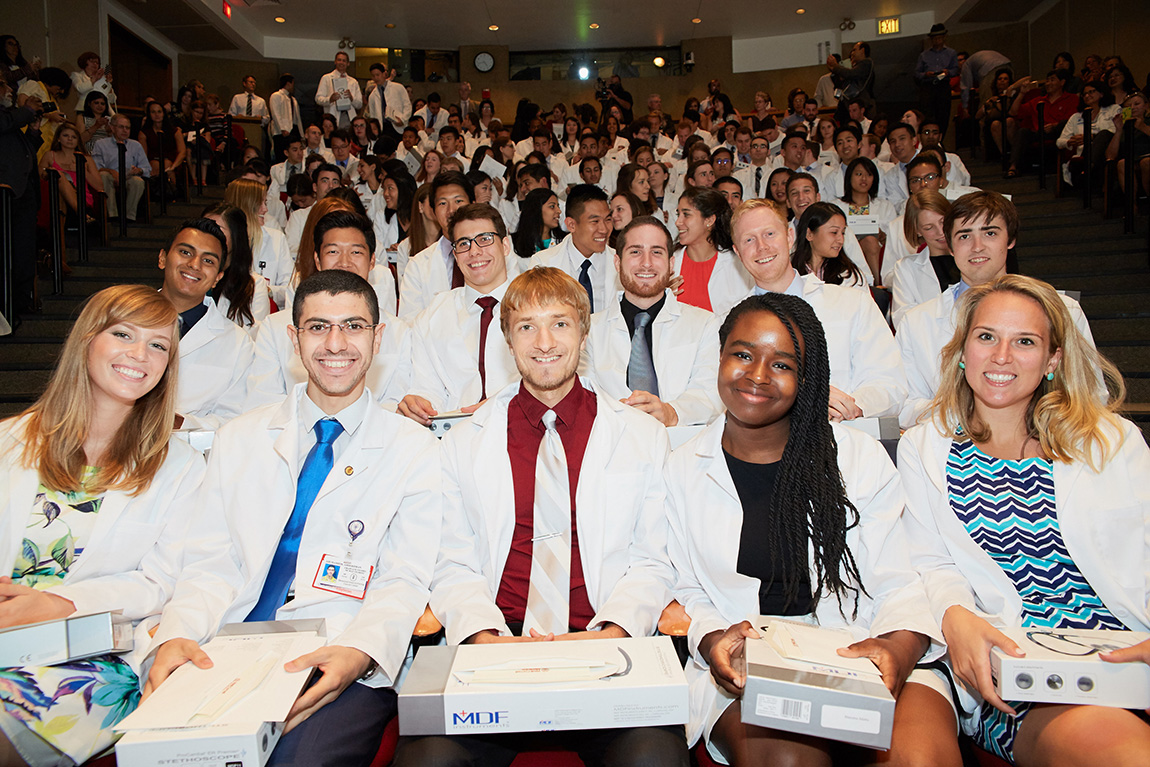White Coat Ceremony: a medical journey begins
By Alyssa Sunkin-Strube

Christina Zecca knew from the time she took high school biology that she wanted to be a doctor, but a summer program two years ago inspired her to pursue her medical education at Weill Cornell Medicine.
While at Cornell University studying neurobiology, she learned about Weill Cornell Medicine’s Traveler’s Summer Research Fellowship Program, which exposes 25 pre-med students to the world of medicine and empowers them to help eliminate healthcare disparities in underserved communities. Zecca fell in love with the work and with the Weill Cornell Medicine community, its students, faculty and mission. Her experience in the Traveler’s program confirmed her desire to become a doctor.
Now Zecca, 23, of Westchester, Pennsylvania, is one step closer to realizing that aspiration, joining 106 fellow classmates in Weill Cornell Medical College’s Class of 2020 who received their white coats at the annual White Coat Ceremony Aug. 16.
“It’s like the best feeling in the world,” Zecca said of receiving her white coat. “The day I got accepted at Weill Cornell Medical College is honestly the best day of my life so far.”
Students descended the steps of Uris Auditorium in groups of four, where they met Weill Cornell Medicine faculty who helped them slip on fresh white coats – a tradition that officially launches the next phase in their medical careers. The White Coat Ceremony is as much a rite of passage for aspiring physicians as it is a time when they can reflect on the journey that led to this moment and the journey that lies ahead.
“Science is transforming the practice of medicine,” said Dr. Augustine M.K. Choi, interim dean of Weill Cornell Medicine, “and when you begin treating patients, you will be able to help them in ways that previous generations never could. Today’s ceremony marks the first step in your training, and in what we hope will be a lifetime of learning about medicine and about science.”
Take it from keynote speaker Dr. Monika Safford ’86, a Weill Cornell Medicine alumna and chief of the Division of General Internal Medicine, who recalled what medicine was like 34 years ago when she was a first-year student.
Doctors then were observing the first cases of HIV; thanks to scientific discovery, a once fatal disease is now largely chronic. Cancer treatments were almost as toxic as the disease itself; now there are targeted therapies that have changed patients’ lives. Advances in science and medicine have transformed healthcare, she said, revealing vast opportunities for the next generation of healthcare leaders to innovate.
“The thrill of making the right diagnosis and sending a sick person back on the road to health is one that is truly without parallel in other professions,” Safford said. “This is an honor and a privilege that you have rightly earned, and I hope you find some time to appreciate and then take advantage of the opportunity you have before you.”
Andrew Yin, 23, of Rockville, Maryland, discovered his passion for medicine halfway through college at Wesleyan University, where he triple majored in chemistry, molecular biology and biochemistry, and neuroscience and behavior. After exploring various scientific career paths, he decided that medicine offered him the greatest opportunity to make a difference in patients’ lives.
“There’s something special about learning about people’s journeys, hearing their stories,” he said. “I wanted to use science to be a part of that and help them achieve their best and healthiest journeys.”
He too has his own journey ahead. “I’m excited and proud to be donning the white coat,” he said. “But I still have to earn it.”
Alyssa Sunkin-Strube is an editor for Weill Cornell Medicine.
Media Contact
Get Cornell news delivered right to your inbox.
Subscribe